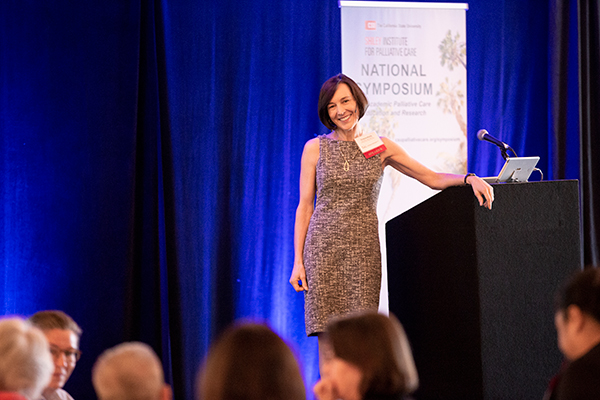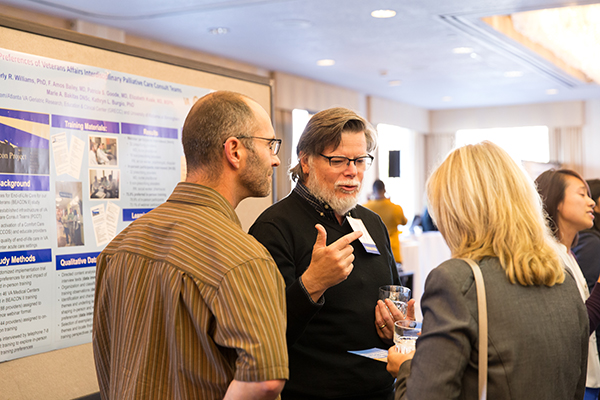2019 Palliative Care Symposium Recap
Collaborative and conscious leadership – from palliative care clinicians and educators in any role and every discipline – is the key to advancing the field and influencing change within and around us, according to speakers at this year’s National Symposium for Palliative Care Education and Research.
The 2019 Symposium gathered university faculty, clinicians, and researchers from across the country for two days of plenaries, workshops, panels, paper sessions, and poster sessions focused on shaping the future of palliative care teaching and practice. The theme of this year’s event was “Advancing Palliative Care: Leading into the Future.
In the opening keynote, leadership and resiliency expert Dr. Daniel Friedland said practicing conscious leadership allows us to lead from a higher self so we can positively influence others. Conscious leadership requires openness, kindness, curiosity, focus, and purpose, Friedland said.
Self-compassion, self-care, and empathy are powerful building blocks of conscious leadership, he added.
“When healthcare providers model empathy, compassion, and caring, we reduce patient anxiety and stress and activate patient satisfaction and healing,” said Friedland, a physician, author, and the CEO of SuperSmart Health. “We are the medicine.”
Ritchie Encourages Sharing Mantle of Leadership
In another Symposium plenary, palliative care visionary Christine Ritchie, MD, MSPH, FACP, FAAHPM, said working together and sharing the mantle of leadership is key to achieving improving and expanding care for people with serious illness.
“Collaborative leadership is what’s needed to take palliative care to the next level,” said Ritchie. She acknowledged that leading together isn’t always easy.
“The challenge is that for collaborative leadership to happen, we have to get ourselves out of the way,” said Ritchie, the Minaker Chair in Geriatrics and Director of Research for the Division of Palliative Care and Geriatric Medicine at Massachusetts General Hospital (MGH).

She said there are several “beacons” that have helped her practice collaborative leadership and overcome its challenges throughout her career: Embracing community, listening to truth-tellers, practicing stillness/mindfulness, and experiencing awe. Ritchie also urged attendees to identify their own beacons, and commit to working together and engaging others to act as leaders.
“Collaborative leadership is hard because it’s not the norm and the path is often unclear,” Ritchie said. “We need to listen to our neighbors, our community, our colleagues, and pay attention to everything going on around our nation that affects people with serious illness.”
Research Takes Center Stage at Symposium
The Symposium’s leadership theme carried over into workshops, panels, and paper and poster presentations that reflected how innovative research leading the way in palliative care teaching and practice.
Research topics ranged from “Assessing Training Outcomes of a Multi-Modal Self-Care Curriculum of Palliative Medicine Fellowship Program,” presented by a team from The University of Alabama at Birmingham, to “Interdisciplinary Clinical Mentorship of Spiritual Care Trainees,” presented by researchers from UC San Diego Health.

F. Amos Bailey, MD, Director, Master Science in Palliative Care, University of Colorado Anschutz Medical Campus, was honored with one of the Symposium’s first Meritorious Research Awards for his poster on “Training Preferences of Veterans Affairs Interdisciplinary Palliative Care Consult Teams.”
Bailey worked on the project with colleagues from The University of Alabama at Birmingham, Department of Veterans Affairs, and Dell Medical School, University of Texas at Austin. Their poster was one of 23 presented at the Symposium, during an interactive reception with authors that has become a hallmark of the annual event.
Symposium workshops were equally robust. In a panel on “How Understanding the Caregiver Experience Can Help Reduce Risk Prolonged Grief,” Ranak Trivedi, PhD, Assistant Professor of Psychiatry and Behavioral Sciences at Stanford University, VA Palo Alto Health Care System, and Julia Kasl-Godley, PhD, from The Wright Institute, spoke about protective factors for complications in bereavement and strategies for reducing risk.
“We experience grief as a way to maintain our psychological connection to those we have lost,” Kasi-Godley said. Interventions that address the collective needs of the caregiver patient dyad are needed, she said, to reduce the risk of prolonged grief, increase individual coping, and enhance family cohesion.
In another workshop, focused on the needs of young people who serve as caregivers for parents or grandparents, a group of researchers from throughout the U.S. and Canada talked about the enormous challenges facing young caregivers and the need for new programs that support them.
“In the United States we have millions of kids under age 18 who are providing care to adults with serious illness, mental health issues, or substance abuse issues,” said Dr. Sharon Hamill, a professor at Cal State University San Marcos, and a leader in a national research group focused on young caregivers. “These kids are typically unacknowledged and untrained for this kind of work – and many will carry the effects of this into their futures.”
2018 Seed Grant Recipients Present Work
The Symposium also highlighted the results of five research projects that received seed grant funding at the 2018 Symposium through the Gary and Mary West Foundation. Those projects ranged from studies on “Narrative Medicine and Advance Care Planning” to “Palliative Care Knowledge and Needs among Caregivers of Cognitively Impaired Older Adults.”
Nidhi Mahendra, PhD, CCC-SLP, Associate Professor, Communicative Disorders & Sciences, Spartan Aphasia Research Clinic, San Jose State University, presented the results of her seed grant project on “Investigating Communicative Access in Advance Directive Planning for Persons with Aphasia.”

Mahendra’s study – based on a sample of 22 persons with aphasia – found that, among other things, persons with aphasia expressed a strong desire to communicate their end-of-life healthcare preferences; benefited from game-oriented approaches to advance care planning; and required an average of 5-6 interventions to complete the advance directive process.
In another seed-grant presentation, Kim Martz, PhD, RN, School of Nursing, at Boise State University, discussed her study on “Palliative Care Referrals in the ICU” with Boise State colleague Jenny Alerden, PhD, RN. Their team followed up on 300 patients at St. Luke Meridian Medical Center ICU who screened positive on a palliative care referral “trigger” tool. The team successfully gathered data on 112 of those patients.
The study found less than half (42 percent) of those identified as needing a palliative care consult actually received one. Those who received a consult were significantly less likely to receive invasive mechanical ventilation. Still, Martz said, researchers found that the screening tool brought heightened awareness about palliative care to the care team working in the ICU.
Symposium Provides Unforgettable Experience
The 2019 Symposium highlighted an extraordinary breadth and depth of innovative educational endeavors, said Pam Kohlbry, PhD, RN, Director of University Relations at the CSU Shiley Institute for Palliative Care.
“The attendees and presenters I met were committed to palliative care,” said Kohlbry. “Their work and lives inspired me. The keynote, plenary, and breakout presentations were thought provoking and engaging, and the topics reinforced palliative care’s commitment to holistic healthcare with attention to spirituality, self-care, artistic expression, and caregiver support.”
Kohlbry has already begun planning next year’s Symposium alongside a committee of interdisciplinary faculty from multiple universities throughout the U.S. The 2020 conference will again take place at the Sheraton San Diego Hotel & Marina. The Institute will issue a Call for Abstracts in January.
For more on the Symposium, including a slideshow of the 2020 conference, visit csupalliativecare.org/symposium.




